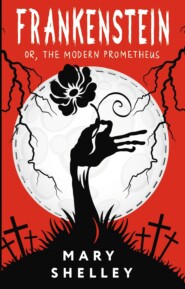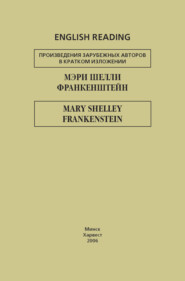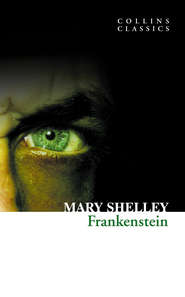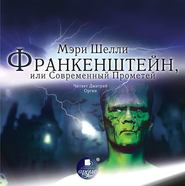По всем вопросам обращайтесь на: info@litportal.ru
(©) 2003-2025.
✖
Frankenstein, or The Modern Prometheus / Франкенштейн, или Современный Прометей. Книга для чтения на английском языке
Настройки чтения
Размер шрифта
Высота строк
Поля
Because he knows a frightful fiend
Doth close behind him tread.
Continuing thus, I came at length opposite to the inn at which the various diligences and carriages usually stopped. Here I paused, I knew not why; but I remained some minutes with my eyes fixed on a coach that was coming towards me from the other end of the street. As it drew nearer I observed that it was the Swiss diligence; it stopped just where I was standing, and on the door being opened, I perceived Henry Clerval, who, on seeing me, instantly sprung out.
My dear Frankenstein,
exclaimed he,
how glad I am to see you! How fortunate that you should be here at the very moment of my alighting!
Nothing could equal my delight on seeing Clerval; his presence brought back to my thoughts, my father, Elizabeth, and all those scenes of home so dear to my recollection. I grasped his hand, and in a moment forgot my horror and misfortune; I felt suddenly, and for the first time during many months, calm and serene joy. I welcomed my friend, therefore, in the most cordial manner, and we walked towards my college. Clerval continued talking for some time about our mutual friends and his own good fortune in being permitted to come to Ingolstadt.
You may easily believe,
said he,
how great was the difficulty to persuade my father that all necessary knowledge was not comprised in the noble art of bookkeeping; and, indeed, I believe I left him incredulous to the last, for his constant answer to my unwearied entreaties was the same as that of the Dutch schoolmaster in The Vicar of Wakefield: ‘I have ten thousand florins a year without Greek, I eat heartily without Greek.’ But his affection for me at length overcame his dislike of learning, and he has permitted me to undertake a voyage of discovery to the land of knowledge.
It gives me the greatest delight to see you; but tell me how you left my father, brothers, and Elizabeth.
Very well, and very happy, only a little uneasy that they hear from you so seldom. By the by[7 - by the by – кстати], I mean to lecture you a little upon their account myself. But, my dear Frankenstein,
continued he,
stopping short and gazing full in my face, I did not before remark how very ill you appear; so thin and pale; you look as if you had been watching for several nights.
You have guessed right; I have lately been so deeply engaged in one occupation that I have not allowed myself sufficient rest, as you see; but I hope, I sincerely hope, that all these employments are now at an end and that I am at length free.
I trembled excessively; I could not endure to think of, and far less to allude to, the occurrences of the preceding night. I walked with a quick pace, and we soon arrived at my college. I then reflected, and the thought made me shiver, that the creature whom I had left in my apartment might still be there, alive and walking about. I dreaded to behold this monster, but I feared still more that Henry should see him. Entreating him, therefore, to remain a few minutes at the bottom of the stairs, I darted up towards my own room. My hand was already on the lock of the door before I recollected myself. I then paused, and a cold shivering came over me. I threw the door forcibly open, as children are accustomed to do when they expect a spectre to stand in waiting for them on the other side; but nothing appeared. I stepped fearfully in: the apartment was empty, and my bedroom was also freed from its hideous guest. I could hardly believe that so great a good fortune could have befallen me, but when I became assured that my enemy had indeed fled, I clapped my hands for joy and ran down to Clerval.
We ascended into my room, and the servant presently brought breakfast; but I was unable to contain myself. It was not joy only that possessed me; I felt my flesh tingle with excess of sensitiveness, and my pulse beat rapidly. I was unable to remain for a single instant in the same place; I jumped over the chairs, clapped my hands, and laughed aloud. Clerval at first attributed my unusual spirits to joy on his arrival, but when he observed me more attentively, he saw a wildness in my eyes for which he could not account, and my loud, unrestrained, heartless laughter frightened and astonished him.
My dear Victor,
cried he,
what, for God’s sake, is the matter? Do not laugh in that manner. How ill you are! What is the cause of all this?
Do not ask me,
cried I, putting my hands before my eyes, for I thought I saw the dreaded spectre glide into the room;
he can tell. Oh, save me! Save me!
I imagined that the monster seized me; I struggled furiously and fell down in a fit.
Poor Clerval! What must have been his feelings?
A meeting, which he anticipated with such joy, so strangely turned to bitterness. But I was not the witness of his grief, for I was lifeless and did not recover my senses for a long, long time.
This was the commencement of a nervous fever which confined me for several months. During all that time Henry was my only nurse. I afterwards learned that, knowing my father’s advanced age and unfitness for so long a journey, and how wretched my sickness would make Elizabeth, he spared them this grief by concealing the extent of my disorder. He knew that I could not have a more kind and attentive nurse than himself; and, firm in the hope he felt of my recovery, he did not doubt that, instead of doing harm, he performed the kindest action that he could towards them.
But I was in reality very ill, and surely nothing but the unbounded and unremitting attentions of my friend could have restored me to life. The form of the monster on whom I had bestowed existence was forever before my eyes, and I raved incessantly concerning him. Doubtless my words surprised Henry; he at first believed them to be the wanderings of my disturbed imagination, but the pertinacity with which I continually recurred to the same subject persuaded him that my disorder indeed owed its origin to some uncommon and terrible event.
By very slow degrees, and with frequent relapses that alarmed and grieved my friend, I recovered. I remember the first time I became capable of observing outward objects with any kind of pleasure, I perceived that the fallen leaves had disappeared and that the young buds were shooting forth from the trees that shaded my window. It was a divine spring, and the season contributed greatly to my convalescence. I felt also sentiments of joy and affection revive in my bosom; my gloom disappeared, and in a short time I became as cheerful as before I was attacked by the fatal passion.
Dearest Clerval,
exclaimed I,
how kind, how very good you are to me. This whole winter, instead of being spent in study, as you promised yourself, has been consumed in my sick room. How shall I ever repay you? I feel the greatest remorse for the disappointment of which I have been the occasion, but you will forgive me.
You will repay me entirely if you do not discompose yourself, but get well as fast as you can; and since you appear in such good spirits, I may speak to you on one subject, may I not?
I trembled. One subject! What could it be? Could he allude to an object on whom I dared not even think?
Compose yourself,
said Clerval, who observed my change of colour,
I will not mention it if it agitates you; but your father and cousin would be very happy if they received a letter from you in your own handwriting. They hardly know how ill you have been and are uneasy at your long silence.
Is that all, my dear Henry? How could you suppose that my first thought would not fly towards those dear, dear friends whom I love and who are so deserving of my love?
If this is your present temper, my friend, you will perhaps be glad to see a letter that has been lying here some days for you; it is from your cousin, I believe.
VI
[Speaker: Frankenstein]
Letter from Elizabeth to Frankenstein
Clerval then put the following letter into my hands. It was from my own Elizabeth:
“My dearest Cousin,
“You have been ill, very ill, and even the constant letters of dear kind Henry are not sufficient to reassure me on your account. You are forbidden to write – to hold a pen; yet one word from you, dear Victor, is necessary to calm our apprehensions. For a long time I have thought that each post would bring this line, and my persuasions have restrained my uncle from undertaking a journey to Ingolstadt. I have prevented his encountering the inconveniences and perhaps dangers of so long a journey, yet how often have I regretted not being able to perform it myself! I figure to myself that the task of attending on your sickbed has devolved on some mercenary old nurse, who could never guess your wishes nor minister to them with the care and affection of your poor cousin. Yet that is over now: Clerval writes that indeed you are getting better. I eagerly hope that you will confirm this intelligence soon in your own handwriting.
“Get well – and return to us. You will find a happy, cheerful home and friends who love you dearly. Your father’s health is vigorous, and he asks but to see you, but to be assured that you are well; and not a care will ever cloud his benevolent countenance. How pleased you would be to remark the improvement of our Ernest! He is now sixteen and full of activity and spirit. He is desirous to be a true Swiss and to enter into foreign service; but we cannot part with him, at least until his elder brother return to us. My uncle is not pleased with the idea of a military career in a distant country, but Ernest never had your powers of application. He looks upon study as an odious fetter; his time is spent in the open air, climbing the hills or rowing on the lake. I fear that he will become an idler unless we yield the point and permit him to enter on the profession which he has selected.
“Little alteration, except the growth of our dear children, has taken place since you left us. The blue lake and snow-clad mountains – they never change; and I think our placid home and our contented hearts are regulated by the same immutable laws. My trifling occupations take up my time and amuse me, and I am rewarded for any exertions by seeing none but happy, kind faces around me. Since you left us, but one change has taken place in our little household. Do you remember on what occasion Justine Moritz entered our family? Probably you do not; I will relate her history, therefore, in a few words. Madame Moritz, her mother, was a widow with four children, of whom Justine was the third. This girl had always been the favourite of her father, but through a strange perversity, her mother could not endure her, and after the death of M. Moritz, treated her very ill. My aunt observed this, and when Justine was twelve years of age, prevailed on her mother to allow her to live at our house. The republican institutions of our country have produced simpler and happier manners than those which prevail in the great monarchies that surround it. Hence there is less distinction between the several classes of its inhabitants; and the lower orders, being neither so poor nor so despised, their manners are more refined and moral. A servant in Geneva does not mean the same thing as a servant in France and England. Justine, thus received in our family, learned the duties of a servant, a condition which, in our fortunate country, does not include the idea of ignorance and a sacrifice of the dignity of a human being.
“Justine, you may remember, was a great favourite of yours; and I recollect you once remarked that if you were in an ill humour, one glance from Justine could dissipate it, for the same reason that Ariosto gives concerning the beauty of Angelica – she looked so frank-hearted and happy. My aunt conceived a great attachment for her, by which she was induced to give her an education superior to that which she had at first intended. This benefit was fully repaid; Justine was the most grateful little creature in the world: I do not mean that she made any professions; I never heard one pass her lips, but you could see by her eyes that she almost adored her protectress. Although her disposition was gay and in many respects inconsiderate, yet she paid the greatest attention to every gesture of my aunt. She thought her the model of all excellence and endeavoured to imitate her phraseology and manners, so that even now she often reminds me of her.
“When my dearest aunt died everyone was too much occupied in their own grief to notice poor Justine, who had attended her during her illness with the most anxious affection. Poor Justine was very ill, but other trials were reserved for her.
“One by one, her brothers and sister died; and her mother, with the exception of her neglected daughter, was left childless. The conscience of the woman was troubled; she began to think that the deaths of her favourites was a judgment from heaven to chastise her partiality. She was a Roman Catholic, and I believe her confessor confirmed the idea which she had conceived. Accordingly, a few months after your departure for Ingolstadt, Justine was called home by her repentant mother. Poor girl! She wept when she quitted our house; she was much altered since the death of my aunt; grief had given softness and a winning mildness to her manners which had before been remarkable for vivacity. Nor was her residence at her mother’s house of a nature to restore her gaiety. The poor woman was very vacillating in her repentance. She sometimes begged Justine to forgive her unkindness but much oftener accused her of having caused the deaths of her brothers and sister. Perpetual fretting at length threw Madame Moritz into a decline, which at first increased her irritability, but she is now at peace forever. She died on the first approach of cold weather, at the beginning of this last winter. Justine has returned to us, and I assure you I love her tenderly. She is very clever and gentle and extremely pretty; as I mentioned before, her mien and her expressions continually remind me of my dear aunt.
“I must say also a few words to you, my dear cousin, of little darling William. I wish you could see him; he is very tall of his age, with sweet laughing blue eyes, dark eyelashes, and curling hair. When he smiles, two little dimples appear on each cheek, which are rosy with health. He has already had one or two little wives, but Louisa Biron is his favourite, a pretty little girl of five years of age.
Doth close behind him tread.
Continuing thus, I came at length opposite to the inn at which the various diligences and carriages usually stopped. Here I paused, I knew not why; but I remained some minutes with my eyes fixed on a coach that was coming towards me from the other end of the street. As it drew nearer I observed that it was the Swiss diligence; it stopped just where I was standing, and on the door being opened, I perceived Henry Clerval, who, on seeing me, instantly sprung out.
My dear Frankenstein,
exclaimed he,
how glad I am to see you! How fortunate that you should be here at the very moment of my alighting!
Nothing could equal my delight on seeing Clerval; his presence brought back to my thoughts, my father, Elizabeth, and all those scenes of home so dear to my recollection. I grasped his hand, and in a moment forgot my horror and misfortune; I felt suddenly, and for the first time during many months, calm and serene joy. I welcomed my friend, therefore, in the most cordial manner, and we walked towards my college. Clerval continued talking for some time about our mutual friends and his own good fortune in being permitted to come to Ingolstadt.
You may easily believe,
said he,
how great was the difficulty to persuade my father that all necessary knowledge was not comprised in the noble art of bookkeeping; and, indeed, I believe I left him incredulous to the last, for his constant answer to my unwearied entreaties was the same as that of the Dutch schoolmaster in The Vicar of Wakefield: ‘I have ten thousand florins a year without Greek, I eat heartily without Greek.’ But his affection for me at length overcame his dislike of learning, and he has permitted me to undertake a voyage of discovery to the land of knowledge.
It gives me the greatest delight to see you; but tell me how you left my father, brothers, and Elizabeth.
Very well, and very happy, only a little uneasy that they hear from you so seldom. By the by[7 - by the by – кстати], I mean to lecture you a little upon their account myself. But, my dear Frankenstein,
continued he,
stopping short and gazing full in my face, I did not before remark how very ill you appear; so thin and pale; you look as if you had been watching for several nights.
You have guessed right; I have lately been so deeply engaged in one occupation that I have not allowed myself sufficient rest, as you see; but I hope, I sincerely hope, that all these employments are now at an end and that I am at length free.
I trembled excessively; I could not endure to think of, and far less to allude to, the occurrences of the preceding night. I walked with a quick pace, and we soon arrived at my college. I then reflected, and the thought made me shiver, that the creature whom I had left in my apartment might still be there, alive and walking about. I dreaded to behold this monster, but I feared still more that Henry should see him. Entreating him, therefore, to remain a few minutes at the bottom of the stairs, I darted up towards my own room. My hand was already on the lock of the door before I recollected myself. I then paused, and a cold shivering came over me. I threw the door forcibly open, as children are accustomed to do when they expect a spectre to stand in waiting for them on the other side; but nothing appeared. I stepped fearfully in: the apartment was empty, and my bedroom was also freed from its hideous guest. I could hardly believe that so great a good fortune could have befallen me, but when I became assured that my enemy had indeed fled, I clapped my hands for joy and ran down to Clerval.
We ascended into my room, and the servant presently brought breakfast; but I was unable to contain myself. It was not joy only that possessed me; I felt my flesh tingle with excess of sensitiveness, and my pulse beat rapidly. I was unable to remain for a single instant in the same place; I jumped over the chairs, clapped my hands, and laughed aloud. Clerval at first attributed my unusual spirits to joy on his arrival, but when he observed me more attentively, he saw a wildness in my eyes for which he could not account, and my loud, unrestrained, heartless laughter frightened and astonished him.
My dear Victor,
cried he,
what, for God’s sake, is the matter? Do not laugh in that manner. How ill you are! What is the cause of all this?
Do not ask me,
cried I, putting my hands before my eyes, for I thought I saw the dreaded spectre glide into the room;
he can tell. Oh, save me! Save me!
I imagined that the monster seized me; I struggled furiously and fell down in a fit.
Poor Clerval! What must have been his feelings?
A meeting, which he anticipated with such joy, so strangely turned to bitterness. But I was not the witness of his grief, for I was lifeless and did not recover my senses for a long, long time.
This was the commencement of a nervous fever which confined me for several months. During all that time Henry was my only nurse. I afterwards learned that, knowing my father’s advanced age and unfitness for so long a journey, and how wretched my sickness would make Elizabeth, he spared them this grief by concealing the extent of my disorder. He knew that I could not have a more kind and attentive nurse than himself; and, firm in the hope he felt of my recovery, he did not doubt that, instead of doing harm, he performed the kindest action that he could towards them.
But I was in reality very ill, and surely nothing but the unbounded and unremitting attentions of my friend could have restored me to life. The form of the monster on whom I had bestowed existence was forever before my eyes, and I raved incessantly concerning him. Doubtless my words surprised Henry; he at first believed them to be the wanderings of my disturbed imagination, but the pertinacity with which I continually recurred to the same subject persuaded him that my disorder indeed owed its origin to some uncommon and terrible event.
By very slow degrees, and with frequent relapses that alarmed and grieved my friend, I recovered. I remember the first time I became capable of observing outward objects with any kind of pleasure, I perceived that the fallen leaves had disappeared and that the young buds were shooting forth from the trees that shaded my window. It was a divine spring, and the season contributed greatly to my convalescence. I felt also sentiments of joy and affection revive in my bosom; my gloom disappeared, and in a short time I became as cheerful as before I was attacked by the fatal passion.
Dearest Clerval,
exclaimed I,
how kind, how very good you are to me. This whole winter, instead of being spent in study, as you promised yourself, has been consumed in my sick room. How shall I ever repay you? I feel the greatest remorse for the disappointment of which I have been the occasion, but you will forgive me.
You will repay me entirely if you do not discompose yourself, but get well as fast as you can; and since you appear in such good spirits, I may speak to you on one subject, may I not?
I trembled. One subject! What could it be? Could he allude to an object on whom I dared not even think?
Compose yourself,
said Clerval, who observed my change of colour,
I will not mention it if it agitates you; but your father and cousin would be very happy if they received a letter from you in your own handwriting. They hardly know how ill you have been and are uneasy at your long silence.
Is that all, my dear Henry? How could you suppose that my first thought would not fly towards those dear, dear friends whom I love and who are so deserving of my love?
If this is your present temper, my friend, you will perhaps be glad to see a letter that has been lying here some days for you; it is from your cousin, I believe.
VI
[Speaker: Frankenstein]
Letter from Elizabeth to Frankenstein
Clerval then put the following letter into my hands. It was from my own Elizabeth:
“My dearest Cousin,
“You have been ill, very ill, and even the constant letters of dear kind Henry are not sufficient to reassure me on your account. You are forbidden to write – to hold a pen; yet one word from you, dear Victor, is necessary to calm our apprehensions. For a long time I have thought that each post would bring this line, and my persuasions have restrained my uncle from undertaking a journey to Ingolstadt. I have prevented his encountering the inconveniences and perhaps dangers of so long a journey, yet how often have I regretted not being able to perform it myself! I figure to myself that the task of attending on your sickbed has devolved on some mercenary old nurse, who could never guess your wishes nor minister to them with the care and affection of your poor cousin. Yet that is over now: Clerval writes that indeed you are getting better. I eagerly hope that you will confirm this intelligence soon in your own handwriting.
“Get well – and return to us. You will find a happy, cheerful home and friends who love you dearly. Your father’s health is vigorous, and he asks but to see you, but to be assured that you are well; and not a care will ever cloud his benevolent countenance. How pleased you would be to remark the improvement of our Ernest! He is now sixteen and full of activity and spirit. He is desirous to be a true Swiss and to enter into foreign service; but we cannot part with him, at least until his elder brother return to us. My uncle is not pleased with the idea of a military career in a distant country, but Ernest never had your powers of application. He looks upon study as an odious fetter; his time is spent in the open air, climbing the hills or rowing on the lake. I fear that he will become an idler unless we yield the point and permit him to enter on the profession which he has selected.
“Little alteration, except the growth of our dear children, has taken place since you left us. The blue lake and snow-clad mountains – they never change; and I think our placid home and our contented hearts are regulated by the same immutable laws. My trifling occupations take up my time and amuse me, and I am rewarded for any exertions by seeing none but happy, kind faces around me. Since you left us, but one change has taken place in our little household. Do you remember on what occasion Justine Moritz entered our family? Probably you do not; I will relate her history, therefore, in a few words. Madame Moritz, her mother, was a widow with four children, of whom Justine was the third. This girl had always been the favourite of her father, but through a strange perversity, her mother could not endure her, and after the death of M. Moritz, treated her very ill. My aunt observed this, and when Justine was twelve years of age, prevailed on her mother to allow her to live at our house. The republican institutions of our country have produced simpler and happier manners than those which prevail in the great monarchies that surround it. Hence there is less distinction between the several classes of its inhabitants; and the lower orders, being neither so poor nor so despised, their manners are more refined and moral. A servant in Geneva does not mean the same thing as a servant in France and England. Justine, thus received in our family, learned the duties of a servant, a condition which, in our fortunate country, does not include the idea of ignorance and a sacrifice of the dignity of a human being.
“Justine, you may remember, was a great favourite of yours; and I recollect you once remarked that if you were in an ill humour, one glance from Justine could dissipate it, for the same reason that Ariosto gives concerning the beauty of Angelica – she looked so frank-hearted and happy. My aunt conceived a great attachment for her, by which she was induced to give her an education superior to that which she had at first intended. This benefit was fully repaid; Justine was the most grateful little creature in the world: I do not mean that she made any professions; I never heard one pass her lips, but you could see by her eyes that she almost adored her protectress. Although her disposition was gay and in many respects inconsiderate, yet she paid the greatest attention to every gesture of my aunt. She thought her the model of all excellence and endeavoured to imitate her phraseology and manners, so that even now she often reminds me of her.
“When my dearest aunt died everyone was too much occupied in their own grief to notice poor Justine, who had attended her during her illness with the most anxious affection. Poor Justine was very ill, but other trials were reserved for her.
“One by one, her brothers and sister died; and her mother, with the exception of her neglected daughter, was left childless. The conscience of the woman was troubled; she began to think that the deaths of her favourites was a judgment from heaven to chastise her partiality. She was a Roman Catholic, and I believe her confessor confirmed the idea which she had conceived. Accordingly, a few months after your departure for Ingolstadt, Justine was called home by her repentant mother. Poor girl! She wept when she quitted our house; she was much altered since the death of my aunt; grief had given softness and a winning mildness to her manners which had before been remarkable for vivacity. Nor was her residence at her mother’s house of a nature to restore her gaiety. The poor woman was very vacillating in her repentance. She sometimes begged Justine to forgive her unkindness but much oftener accused her of having caused the deaths of her brothers and sister. Perpetual fretting at length threw Madame Moritz into a decline, which at first increased her irritability, but she is now at peace forever. She died on the first approach of cold weather, at the beginning of this last winter. Justine has returned to us, and I assure you I love her tenderly. She is very clever and gentle and extremely pretty; as I mentioned before, her mien and her expressions continually remind me of my dear aunt.
“I must say also a few words to you, my dear cousin, of little darling William. I wish you could see him; he is very tall of his age, with sweet laughing blue eyes, dark eyelashes, and curling hair. When he smiles, two little dimples appear on each cheek, which are rosy with health. He has already had one or two little wives, but Louisa Biron is his favourite, a pretty little girl of five years of age.















